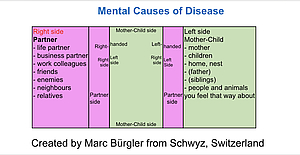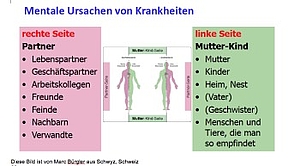Mind of Pathology
Dr. Prafull Vijayakar was aware that the constitution as a whole, the genetic and epigenetic factors are responsible for how the organism reacts with its pathology = with its defences.
§ 189:
... yes, its emergence (the disease) cannot even be thought of as not being caused by the (bilious) life as a whole, so intimately are all parts of the organism connected and form an undividable whole in feelings and activity. ...
It was also clear to Dr. Vijayakar that the mind, thoughts, and mental and emotional events play a core role in the development of diseases, and that most pathologies arise due to emotional conflict.
In The Chronic Diseases, Hahnemann writes:
... the innocent human being can spend 10 years in physical agony in the Bastille or the galley with far less damage to the health than several months in complete physical comfort in an unhappy marriage or with a gnawing conscience. The annual death of the only son causes an incurable suppurative lung disease or breast cancer in the tender mother, who is already psorically ill, or spurned love causes melancholia in the soulful virgin who is already psorically hysterical. .... Constant anguish or vexation soon increase even the tiniest traces of psora that are still dormant to greater symptoms and then cause them to develop unexpectedly into the outbreak of all chronic diseases imaginable with more certainty and frequency than all other detrimental influences on the organism of an ordinary person, and, with just as much certainty and frequency, reinforce the maladies that already exist.
Prafull Vijayakar goes even further: he found that the type of emotional conflict determines the localisation of the disease and has a connection to the person’s sensitivity.
Because: Diseases are the organism’s defence mechanisms
In pathology, we usually proceed as follows:
a) in the case of physiological (psoric) diseases, the "complaints due to" category is helpful
b) in the case of structural (sycotic) diseases, susceptibility is helpful in identifying the constitution
c) in destructive (syphilitic) diseases, it is helpful to find the syphilitic mind behind the syphilitic disease.
Mind of Pathology
Mental causes of disease
Vijayakar found out that diseases very often – maybe even always – have a mental cause. He has researched and observed this system over many years. He has been able to postulate the following:

What does this mean?
Complaints on the right side of the body very often indicate a problem with your partner, i.e. your life partner (husband, wife, boyfriend, girlfriend), business partners, colleagues, friends, enemies, neighbours or relatives.
Complaints on the left side of the body indicate problems with your own mother or child, but also with your father, i.e. parents, children, siblings, and also people and animals you have parental or brotherly or sisterly feelings for.
With genuine left-handed people, i.e. those who are genetically left-handed, the side relationship is reversed.
Here are some more examples:
Autism
Meaning?
· communication cut off
· something the patient has seen or experienced, something that has put him/her off
→ I don’t want to be in this world, in this society, in this family
· Mostly hurt by parents’ behaviour
· Issue of vaccinations? just a trigger. Vaccination can only be a trigger for the existing miasm and
predisposition
· Many autistic children are "Caesarean section children", because the caesarean section quickly
moulds the miasm in the direction of syphilis.
Case:
Why does a child develop autism?
A child came to the surgery after the parents got divorced. The boy was quite normal until the age of 2½, when he suddenly stopped responding to other people. What had happened? At that time, the parents’ arguments were getting worse and worse, but they took care not to argue in front of the child, feigning a normal relationship in his presence. One night there was a big fight. He woke up startled and they immediately switched to using kind words. The boy just stared at them, didn't smile and looked confused. He was completely confused as to whether his parents were arguing or loving each other. The child suffered a shock that caused the confusion. This reaction was the starting point for the prescription.
Category: Complete: Mind, confused, cannot recognise reality: Lap-c-b
(if Lap-c-b or Marble occur, it could be any other Calcium. The boy was given Calc-p and recovered from the condition. After 3 months he was able to communicate with others again and finally go back to a normal school. We should always know which categories there are so that we can ask the appropriate questions.
Another case:
Boy, 10: he had hardly been able to move since the age of 3-4 because of an extreme opisthotonus; when he was lying on the table he looked like a scorpion – I had never prescribed this remedy before, so I asked his father if the boy was very angry and vengeful. The father said he had a very sharp tongue; his brothers and sisters annoyed him and he was vengeful and said: "Just you wait, once I can walk I will kill every one of you, I’ll cut you into pieces, I won’t forget what you said to me". He was so vengeful even though he was disabled! ->Scorpio
Mind of Pathology:
Bent backwards, opisthotonus:
means "I am defiant" – genetically strong-willed and challenging! They will never give in.
Bent forward:
When the body bends forward / bent shoulders: The person is submissive, has no will of their own, no ego, they give in. The name of the disease is not important – it is the disposition behind the disease that puts the body in a certain position. You can find out a lot about the patient from the posture.
And here are a few points or meanings regarding the Mind of Pathology:
· Accumulation: means uncertainty.
· Ascites: means protection, especially of the abdomen and even more of the liver.
· Eyes:
- pointing upwards: arrogance
- loss of colour vision: indifference, no interest
- glaucoma: increase in eye pressure to protect against retinal detachment
- cloudy vision: confused, no clarity
· Elastin high →contraction. Cramping.
- suppressed anger
- fear (boxer raises his hands in front of his face)
· Elastin low →slackness. Loose, weakness of muscles, haemorrhoids, prolapse
- grief, worries. Shock, fright
· Fibrin high →Hardening. Contraction, puckering. Arteriosclerosis, induration, stenoses.
Hardness can break.
- Pedantic, arrogance, hard and unyielding.
· Fibrin low →dilating. Brittle bones, soft nails, weak hand, soft, thin hair.
- Soft person, very sensitive.
· Liver, centre of metabolism
- undigested anger
- fear of starvation
- family conflict.
· Heart: giving of love in general. Supplying the body with blood just as the mother supplies the child with
food. If love remains unfulfilled, the body reacts.
- If the heart is not properly developed, the trauma must have occurred in the first two months of pregnancy.
- Arrhythmias: Consequences of anguish. Anguish leads to the forming of serotonin, which stimulates the production of acetylcholine and thus leads to cardiac arrhythmias.
- Heart attack: Unhappy in marriage.
· Bone: equivalent to the structure. If buildings lack structure, the value decreases.
- Problem: appreciation, self-esteem, humiliation, prestige. Ego. Respect. Existence.
- Identity has been lost.
· Motor neuron disease: A feeling of being trapped.
· Corner of the mouth: connection, relationship.
And much more
About the importance of symptoms
The most important thing for a person is existence, life itself. If there is something that is life-threatening, it takes the highest priority.
1. Life– existence – is the most important thing. If syphilis threatens this, you can forget all the other symptoms, such as prophesying, etc.
2. Determining the sexuality
Left – female side
Right – male side
Example: A child born with a vagina without ovaries and testicles without a penis: I asked the mother directly, "What have you got against men?" She began to cry and said, "I had always had to endure bad things from the men in my family ever since childhood; after I got married, it was the same thing with my husband and his family". She didn't want to marry, but was forced to; didn't want to give birth to a boy.
Categories:
Confusion, sexual identity
Aversion to the opposite sex
Sources:
Dr. Prafull Vijayakar - Mumbai workshop, 24.01.2017; Seminar transcript Renate Greißl
Samuel Hahnemann, The Organon of the Healing Art, 6thedition as issued by Richard Haehl 1921, Haug Verlag
From: "The Chronic Diseases" by Dr. Samuel Hahnemann, First part, second, much more expanded edition p. 139 and p. 140
